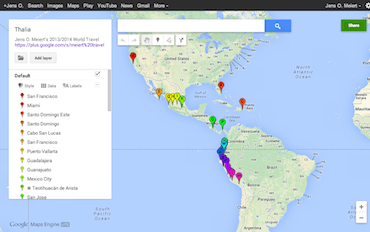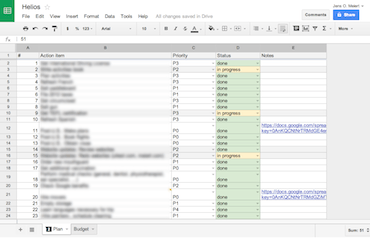How to Just Quit and Travel the World
Published on Jan 7, 2014, filed under adventure. (Share this post, e.g. on Mastodon or on Bluesky.)
The story of my 18 months of travel around the world, including this and other articles, is available as a big but humble e-book: Journey of J.
I really, really, really don’t want to talk about me and my travels right now, especially not after all the more self-centered posts last week, but I also really, really, really want to get this one out. I’m already traveling for half a year, and this post has been in my queue ever since. Okay cool.
A couple of months ago I quit at Google and left the United States to travel the world. I thought it might be interesting to share a bit about how to do something like this, calling it quits and heading out there, with no set itinerary whatsoever. Even though I don’t know whether it’s all obvious. And even though it’s just one, my own perspective—there are certainly other angles and different incentives.
Circumstances and Conditions
Reverse-engineering the actual events, what ignited everything for me was that one day, it was at the end of 2012, I realized what my purpose is. (Does this sound cheesy? I think it tends to only as long as one isn’t clear about one’s purpose.) While my hypothesis is that the goal of quitting and traveling itself is most important, that was the impetus for me.
Now, what conditions had to be met? I observed two factors:
Be socially independent. I was already on a foreign continent, single at the point (or not—different story), and my friends and colleagues were all grown-ups. So I was in a good position to mark this “checked.” I reckon it’s not impossible but acknowledge that with kids, parents who need care, friends in trouble, &c. it may turn near impossible to leave, and to go anywhere.
Be financially independent. Google says it pays “competitively,” and I don’t disagree. And although I had a good standard of living, I was lucky that I had an apartment in San Francisco that did not cost $3,000 or more (rent control is part of the problem there). I wasn’t spending much money on partying, booze, and such, either. So I ended every month with some extra. Here, too, I think it’s not impossible but I’d probably not have done anything if I had been in debt and not in possession of a little cushion.
What else? Don’t look at your status quo, but whether and how you can meet the conditions above. Personally I had to maneuver myself into a slightly better spot to actually proceed. I wanted to make sure I was independent enough, so I informed who I could inform, set expectations with friends, timed my departure to get my yearly bonus paid out and vest a maximum of shares, &c. So if you’re not there yet, think about how you can get closer.
Another important point is certainly how different we are. I’d say that traditionally I’m very independent with people but need a good amount of safety. That first point is good when you want to just get out of wherever, but the second point can restrain yourself. Um. Both can. What I’m trying to say is, some people will have a stronger bond to other people and maybe don’t need much of a safety net. That will make getting to social independence a bit more difficult to attain but help meeting conditions on the monetary side. So mileage varies.
Planning and Preparation

Planning and preparation are critical. A former teacher of mine had a saying that “organization is not everything, but without organization, everything is nothing” comes to mind. Here, too, people are different, and you can probably do with surprisingly little prep work, but I argue that it helps. If only to put your mind at extra ease.
Find all the loose ends. I still see a friend of mine laughing when I told him about my giant list, and how stressed out I was at that point (damn, Felix, just that day! 😉). He had done something similar a year earlier, and traveled for eight months. (We have different personalities.) In hindsight I’d do everything again, however, regarding that level of attention to detail as an asset. That included looking at absolutely everything, documenting it thoroughly, and rigorously working through the resulting roadmap.
Don’t deviate from the plan. Once everything has been collected, documented, and scheduled, it’s important to stick to it. Unless there are unforeseeable, important events like a family emergency, that is. That’s not the project manager in me speaking here but the one who appreciates locking in on goals.
Contingency and Emergency
The last major area is to have a backup plan. Not one in case you don’t even start to travel, but one with which you can keep traveling. It’s the part of the endeavor that adds that extra credible topping of seriousness to it. The backup plan proves to you that you mean it, and, with the briefing of your emergency contacts, makes it harder to back out of the whole adventure.
Prepare for eventualities. This is a fun one: Have you been right to prepare for eventualities if nothing happens—or have you been wrong? (Maybe not a good “right or wrong” question.) Knocking on wood, five+ months into my travels everything has played out well, well in a sense of that I had no emergency and was well equipped for any bump along the way. The philosopher in me is of the view that you can skip this step if you subscribe to the adequate beliefs, but the part of me that likes certainty says it has been good to prepare. At the moment I advise making provisions for the case that something happens. You plan to leave everything behind and just travel, so you don’t want to risk getting your entire trip derailed.
Brief your emergency contacts, and keep them posted. I was a bit vague on the last point but here I can add detail in that it’s important to have at least one person who knows where you are and who can help if something goes wrong. I have three contacts who know where I am, through a regularly updated Google spreadsheet, one of them even with secondary equipment and documents to deploy in the worst case. (Again, knocking on wood.) That mustn’t be heavy-handed but again, here we’re talking about heading out and going where the wind blows us, so while we don’t want to attract disaster it’s good if at least someone has a clue where to start a search if something goes sour.
As you noticed, I got a bit more vague and superficial. I plan to make this a little series, with one future post entirely dedicated to planning, and others sharing a bit more about dealing with uncertainty, and what I’ve personally done to mitigate.
_ Maybe I’m not seeing the forest for the trees anymore and this is all self-evident, but maneuvering yourself into the right circumstances and conditions, focusing on thorough planning and preparation, and making provisions for the worst case are crucial steps in order to just kick it. Then, that I can share too, it only takes a few weeks until one’s adjusted to a new and different style of living. I miss my friends and I occasionally even miss my old world, but most of the time I enjoy being “out there,” out here.
About Me
I’m Jens (long: Jens Oliver Meiert), and I’m an engineering lead, guerrilla philosopher, and indie publisher. I’ve worked as a technical lead and engineering manager for companies you use every day and companies you’ve never heard of, I’m an occasional contributor to web standards (like HTML, CSS, WCAG), and I write and review books for O’Reilly and Frontend Dogma.
I love trying things, not only in web development and engineering management, but also in philosophy. Here on meiert.com I share some of my experiences and perspectives. (I value you being critical, interpreting charitably, and giving feedback.)

